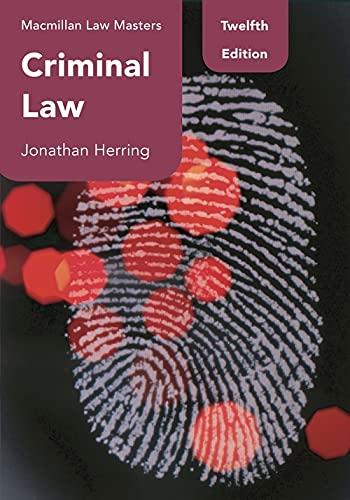Question
What would YOU do? Ethics in Law Enforcement. Ethical behavior is based on standards of right and wrong that prescribe what humans ought to do,
What would YOU do?
Ethics in Law Enforcement. Ethical behavior is based on standards of right and wrong that prescribe what humans ought to do, usually in terms of rights- right to life, the right to freedom from injury, and the right to privacy, for example; obligations to society- for example, standards that impose the reasonable obligations to refrain from rape, stealing, murder, assault, slander, fraud, to live peacefully with others, defend truth and protect the weak; and principles of fairness, or specific virtues- honesty, compassion, and loyalty and other standards and characteristics that are supported by consistent and well-founded reasons. Based on this understanding of ethics, how would you as a criminal justice professional resolve the dilemmas below? Defend your actions in light of the three principles mentioned above.
1. As a patrol officer, you are only doing your job when you stop a car for running a red light. Unfortunately, the driver of the car happens to be the mayor. You decide to "do the right thing" and give him a ticket. The next morning, you get called into the captain's office and are told in no uncertain terms that you have screwed up big time, for there is an "informal" policy extending "courtesy" to city politicians. Several nights later, you observe the mayor's car weaving erratically across lanes and speeding. What would you do? What if the driver were a fellow police officer? What if it was your best friend?
1. Rights:
2. Obligations To Society:
3. Principles of Fairness or Specific Virtues:
2. You are a rookie officer who responds to a call for officer assistance. Arriving at the scene, you see a ring of officers surrounding a suspect who is down on his knees. You don't know what happened before you arrived, but you see a sergeant use a taser on the suspect and you see two or three officers step in and take turns hitting the suspect with their nightsticks about the head and shoulders. This goes on for several minutes as you stand in the back of the circle. No one says anything that would indicate that this is not appropriate behavior. You later learn that the individual, although not directly threatening at that time or resisting arrest, is a well-known criminal who has eluded police for over a year (i.e., they can't seem to make a "case" against him/charges "stick). What would you do in this case regarding the behavior of your fellow officers? What would you do if asked to testify that you observed the suspect make "threatening" gestures to the officers involved?
1. Rights:
2. Obligations To Society:
3. Principles of Fairness or Specific Virtues:
Step by Step Solution
There are 3 Steps involved in it
Step: 1

Get Instant Access to Expert-Tailored Solutions
See step-by-step solutions with expert insights and AI powered tools for academic success
Step: 2

Step: 3

Ace Your Homework with AI
Get the answers you need in no time with our AI-driven, step-by-step assistance
Get Started


